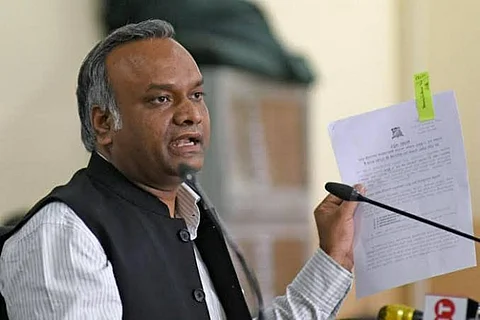

The Karnataka government has announced the framework for a ‘fact-checking unit’ to monitor fake news on social media platforms. The 'fact-checking unit' will be overseen by government officials, police officials, academics, lawyers and civil society members and it will flag social media posts and news reports as 'misinformation', 'disinformation' or 'malinformation', Priyank Kharge, the State Information Technology and BioTechnology Minister told reporters on Thursday, September 14. News organisations posting 'disinformation' or 'malinformation' could face legal consequences, the minister said.
Previous attempts by the Union government to start a ‘fact-check unit’ have been criticised because of the presence of government officials. Even the Karnataka government’s proposal involves ‘fact-checking’ done by government officials with the final review done by the Superintendent of Police, Intelligence or another officer decided by the Home Department.
The government officials involved in the process are heads of the Information Technology, Bio Technology and Science and Technology departments, Additional Director General of Police (ADGP), Intelligence, the Department of Information and Public Relations (DIPR), Managing Director, Karnataka Innovation and Technology Society (KITS), Division of Electrical, Electronics and Computer Science, Indian Institute of Science (IISc), Additional Advocate General, CySecK, Karnataka government's centre of excellence (CoE) for cybersecurity, and representatives of civil society.
Misinformation refers to false or inaccurate information where no harm was meant, Priyank Kharge said. "There is a popular WhatsApp forward which says Jana Gana Mana has won a UNESCO award for best national anthem. This is inaccurate and so, it is misinformation. But it is not causing any harm to the public," Priyank Kharge said.
He described disinformation as false or inaccurate information which is deliberately deceptive and propagated to cause harm. He highlighted tweets by BJP leader Arvind Limbavali over the death of Paresh Mesta, an 18-year-old whose death in December 2017 led to communal violence in Uttara Kannada district. At the time, BJP leaders including Shobha Karandlaje and Arvind Limbavali wrongly alleged that Paresh was "castrated, head split open, and boiling oil was poured on his head". A prolonged investigation by the Central Bureau of Investigation (CBI) concluded in October 2022 that Paresh died due to drowning.
Read: 5 years after BJP claimed Paresh Mesta was tortured and killed, CBI says not a murder
Priyank Kharge further said that cases of 'malinformation' will be flagged by the fact-checking unit. He described 'malinformation' as "genuine information shared to cause harm." He referred to the first information report (FIR) against popular news anchor Sudhir Chaudhary as a case of 'malinformation'. This week, the Bengaluru police filed an FIR against Sudhir Chaudhary accusing him of “deliberate and malicious” misinformation about a commercial vehicle subsidy scheme for minority, SC/ST and backward classes communities.
"(Sudhir Chaudhary) shared a genuine notification of a scheme by a minority corporation. But he is twisting the information to cause harm. He is saying some other communities are being deprived without even understanding that other communities also have similar schemes," Priyank Kharge said.
The 'fact-checking unit' will accept submissions from the public and have teams analysing content online for possible 'fake news'. When a social media post is flagged as 'disinformation' or 'malinformation', the fact-checking unit will reach out to the social media platform and suggest they pull down the content. "If these posts are violating the existing laws of the land, we will forward it to the Home Department to file cases," Priyank Kharge said. Social media users and news organisations can be charged under ten IPC sections including cheating, conducting public mischief, defamation and provocation with intent to cause riots, according to the framework suggested.
While the framework states only social media posts and news items of public interest will be flagged, it is yet to be determined what constitutes 'public interest'. "This is a work in progress and we will be listening to suggestions from the public on how we can make it better," Priyank Kharge said.
The ‘fact-checking unit’ proposed by the Union government under the amended Information Technology Rules is yet to be notified as it is currently being challenged by a plea filed in the Bombay High Court. However, a ‘fact-checking unit’ set up by the Press Information Bureau (PIB) under the Ministry of Information and Broadcasting has been active since 2019. It was revealed in an RTI response this year that it had received nearly 1.2 lakh requests for fact checking information on the internet in the last three years, i.e. since April 2020, whereas it has only acted upon 1,223 of them – an action rate of 1%.